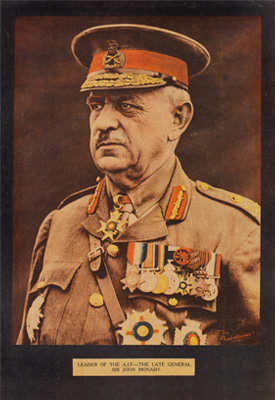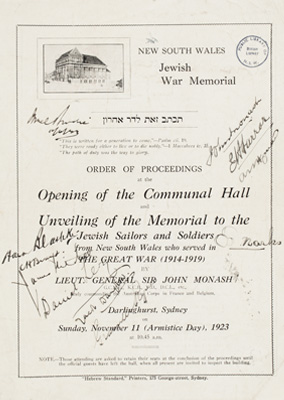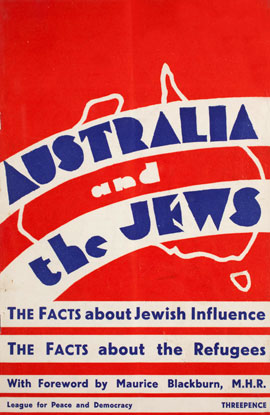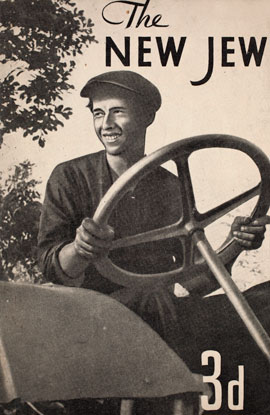Zionism & Australia
Despite being located on opposite sides of the world, Australia and Israel share a bond through episodes in their joint history. Australia’s military endeavors in both world wars and energetic diplomacy in the late 1940s played an important part in the establishment of the independent Jewish state of Israel in 1948. Most Diaspora Jews, even those not wishing to return to Israel, identify with the ideals of Zionism and the protection of Jewish rights everywhere.
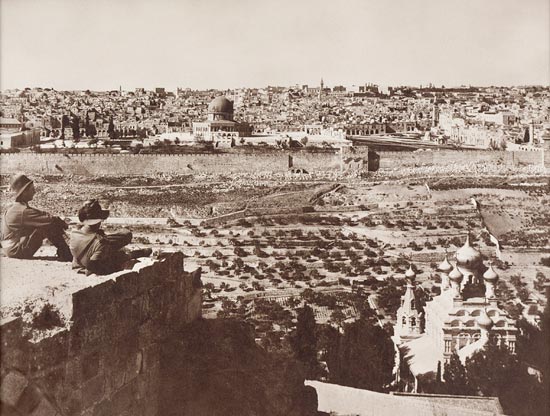
The Zionist movement derives its name from ‘Zion’, the biblical word for the City of Jerusalem and the Land of Israel, the historical birthplace of the Jewish people almost 4,000 years ago. In 1897, the first World Zionist Congress, held in Basle, Switzerland, called for the establishment of a legally secure, publically recognized home for the Jews in Palestine. However, control of the region by the Ottoman Empire proved a major stumbling block to any proposals for the setting up of a Jewish state in the Holy Land.
The outbreak of World War I saw action in the Middle East between the British and Ottoman Empires from 29 October 1914 to 30 October 1918. The Australian Light Horse Regiments, part of the British Empire’s Desert corps, played a decisive role in the invasion of Ottoman-held Palestine in 1917.
> View a selection of images of Australian troops in Palestine during World War I
Australia’s extraordinary military contribution to the ending of 800 years of Ottoman rule in Palestine coincided with publication of the Balfour Declaration in November 1917. This confirmed British Parliamentary support for the establishment of a Jewish National home in Palestine and was the first official step on the road to attainment of Jewish statehood.
Interest in the Zionist movement provoked a new awareness of Jewish culture and heritage among Diaspora Jews, and initiated a global rejuvenation of Jewish identity as local communities set up fund raising campaigns to assist new Jewish settlements being established in Israel.
Early Australian Zionists included important community leaders such as General Sir John Monash, commander of the Australian corps in France from 1917. An Australian born Jew of Prussian parentage, Monash was credited with instigating the offensive which broke the Hindeburg Line thus winning the war. In peacetime, Monash came to be regarded as the greatest living Australian. In 1927 he was made foundation President of the Zionist Federation of Australia, having presided over the opening of the NSW Jewish War Memorial, or Maccabean Hall, in Darlinghurst, Sydney, on 11 November 1923.
> Find out more about the NSW Jewish War Memorial Hall
By the 1920s, Australian Jewry had developed a philosophy of non-distinctiveness in everything except religion. Many Jews feared the distinctiveness that European migrants carried through their language, dress and culture but realised that survival of their community within Australian society depended on new arrivals. The Maccabean Hall gave Sydney’s Jews a meeting place where new arrivals could begin their assimilation into the local community. It also provided a much needed venue for young people to mix and mingle while strengthening their cultural identity through language, social interaction and sport.
> Read about the work of Australia's leading female Zionist Dr Fanny Reading
During the 1930s, with persecution of European Jews on the rise, several resettlement schemes were proposed worldwide. In May 1939, the Freeland League for Jewish Territorial Colonists dispatched Isaac Steinberg (1888-1957) to investigate the feasibility of purchasing 7 million acres in far Northwestern Australia on which to settle 75,000 Jewish refugees. Known as the Kimberely Scheme, this proposal did not proceed, as Prime Minister John Curtin advised in July 1944 that the Australian Constitution did not permit group settlement on this scale.
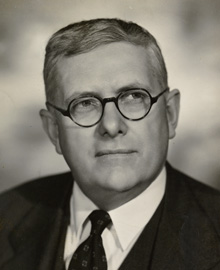 Herbert Vere Evatt (1894-1965),
Herbert Vere Evatt (1894-1965),
ca. 1945, by unknown photographer.
Sepia photoprint. P1/ Evatt, H. V.
The United Nations (UN) was established during the aftermath of World War II. Throughout these formative years, Australia's most notable UN delgate was Dr Herbert Vere Evatt (1894-1965), third President of the UN General Assembly (1948-1949).
Evatt was Chairman of the Ad Hoc Committee on Palestine which proposed the partition of Palestine into separate Arab and Jewish states (with Jerusalem becoming an international enclave). On 29 November 1947, the United Nations General Assembly voted in favour of partition.
On 14 May 1948, the leaders of the Jewish community in Palestine declared independence in accordance with the UN resolution, and Israel was established as the Jewish state.
The Australian Government officially recognized the state of Israel in May 1949 – the first country to do so – and Dr Evatt presided over the vote which admitted Israel to the UN. The Zionist movement had accomplished its principal goal. Today, the State of Israel continues to be of vital importance in Jewish life and to the unity of World Jewry.
> See an official UN press kit for Dr Evatt

